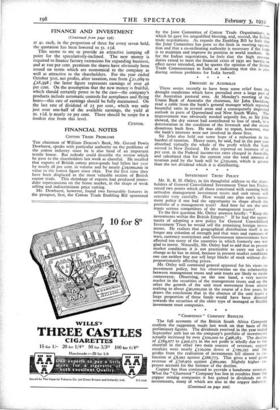THE chairman of William Deacon's Bank, Mr. Gerard Powis Dewhurst,
speaks with particular authority on the problems of the cotton industry since he is also head of an important textile house. But nobody could describe the review which he gave to the shareholders last week as cheerful. He recalled that exports of British cotton piece-goods had fallen last year by nearly 28 per cent. in volume and by nearly £19,000,000 in value to the lowest figure since 185o. For the first time they have been displaced as the most valuable section of British export trade. This shrinkage of exports had produced imme- diate repercussions on the home market, in the shape of weak selling and indiscriminate price cutting.
Mr. Dewhurst, however, found two favourable features in the prospect, first, the Cotton Trade Enabling Bill sponsored
by the Joint Committee of Cotton Trade Organisations, to which he gave his unqualified blessing, and, second, the Indian trade negotiations. As regards the Enabling Bill he feels that the Joint Committee has gone to the limit in meeting oppnsi_ tion and that a co-ordinating authority is necessary if the trade is to maintain and improve its position in world markets. As for the Indian negotiations, he feels that the high revenue duties raised to meet the financial crisis of 1931 are having an effect never intended, and he quotes the opinion of the Senior Trade Commissioner in India as indicating that this is pro.. ducing serious problems for India herself.
* * *










































 Previous page
Previous page